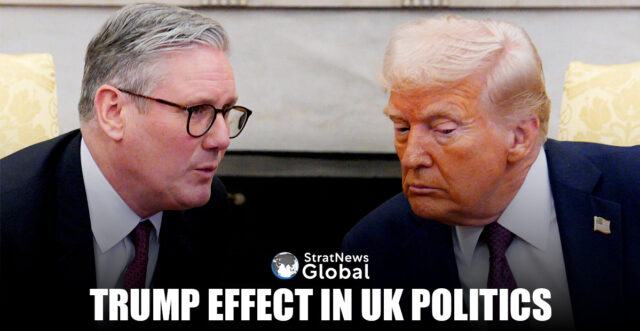Donald Trump is making assertive policy decisions that seem to be influencing politics and policies in other countries. In the United Kingdom, the ripple effect of his policies can be seen across areas. Be it increase in the defence budget, a new transatlantic trade agreement and adoption of a dangerous rhetoric on immigration.
Both UK Prime Minister Keir Starmer and Foreign Secretary David Lammy have been utterly critical of Trump in the past. During a debate in the House of Commons in 2016, Starmer described Trump as ‘absolutely repugnant’ after condemning his comments on Mexican immigrants, Muslims and women’. In 2017, Lammy referred to Trump as a ‘racist/neo-Nazi sympathiser’ which he dismissed in 2024 as ‘old news’. Following their stance, the UK’s governing Labour Party now has to reassess its policy positions and make compromises to maintain the UK-U.S. ‘special relationship’.
Defence Budget
During his re-election campaign, Trump had pledged to stop the war in Ukraine within 24 hours of returning to the Oval Office. Five months later, the war is still on.
During this period, there have been significant changes to the defensive setup of Europe with the U.S. considering reducing troops stationed on the continent and insisting that NATO allies increase defence spending. On May 16, 2025, U.S. Ambassador to NATO Matthew Whitaker confirmed that his country will hold talks with European allies to reduce the number of U.S. troops based in Europe.
In February, Starmer announced the biggest sustained increase (up to 2.5% of the GDP by 2027) to the UK defence budget since the end of Cold War. Other countries such as France and Germany followed suit. Starmer also hosted several global leaders in London in March where he spearheaded the ‘Coalition of the Willing’—a group of countries determined to bring sustained peace by setting up a ‘reassurance force’ in Ukraine.
To increase defence funding, the UK government reduced its foreign aid budget from 0.5% to 0.3% of GDP. Despite Starmer’s emphasis that the decision was based on security needs, critics argue that Trump’s pressure played a significant role. Former Foreign Secretary David Miliband criticised this move, saying cutting foreign aid budget will undermine the UK’s global humanitarian leadership.
Trump’s policy decision has realigned the UK closer to the EU’s defence policy despite Brexit. In Labour’s 2024 election manifesto, the party pledged to conduct a Strategic Defence Review in its first year in office before setting out a ‘path to spending 2.5 per cent of GDP on defence’. Ultimately, a fiery clash between Trump and Zelenskyy, inadvertently led to Starmer fulfilling his manifesto pledge before a review and changing the European defensive landscape for the future.
UK-U.S. Trade Deal
Earlier this month, the UK became the first country to negotiate a deal under Trump’s new tariff regime. The agreement contains a framework for a trade deal and cuts tariffs on specific goods, with months of negotiation yet to come. Key changes include:
- Automotive Sector: Tariffs cut from 27.5% to 10% for up to 100,000 cars annually. Cars are the UK’s biggest export to the US.
- Steel and Aluminium: 25% tariff on steel and aluminium imports into the US has been cut entirely.
- Food Products: The UK has scrapped its 19% tariff on U.S. ethanol and allowed U.S. beef imports up to 13,000 metric tonnes, while maintaining strict food safety standards.
Though the framework provides immediate relief in certain sectors, it leaves issues in areas such as the UK’s digital services tax and tariffs on UK pharmaceutical exports. These lingering disputes impact long-term stability. Prolonged uncertainty with the U.S. could potentially push the UK to align more closely with the EU, where a post-Brexit reset deal is being negotiated, or with India, with whom the UK has already signed a free-trade deal.
Immigration Rhetoric
Perhaps the most blatant shift in UK politics since Trump’s re-election is the change in rhetoric of the British centre-left on immigration and asylum-seekers. When Starmer spelt out his Plan for Change in December 2024—six milestones he wants the public to measure his government against at the next election—immigration was notably omitted. In its election manifesto, Labour even underlined its commitment to various asylum programmes. However, since then, Starmer has increasingly mirrored Trump’s emphasis on border control and national security to counter the rise of far-right sentiment in the UK.
While Starmer had previously pledged to reduce legal immigration and establish the Border Security Command to tackle illegal crossings, critics argue that the narrative is increasingly pandering to far-right sentiment. Following Labour’s loss in a by-election to the Reform Party two weeks ago, Starmer reacted quickly. In his speech introducing the White Paper last week, Starmer suggested that the UK risked becoming an ‘island of strangers’. His speech was widely criticised by those within and outside his party. Labour MP Zarah Sultana compared Starmer’s anti-migrant rhetoric to the controversial ‘Rivers of Blood’ speech by Enoch Powell in 1968 which allegedly caused decades of division and racism. It is a dangerous narrative which comes a few months after the far-right and anti-immigration sentiment led to riots in August 2024.
Interestingly, the anti-immigrant rhetoric is emphasised by the Reform Party in the UK. The same party that was initially backed by Elon Musk, Trump’s key aide. Musk promised to invest £100m in Reform’s campaign before publicly falling out with Farage due to doubts over the latter’s ability to lead. Despite the chaos, Farage remains a popular figure, hoping to become Prime Minister after the next general election. Directly or indirectly, Trump’s hardline stance on immigration is seeping into UK politics.





